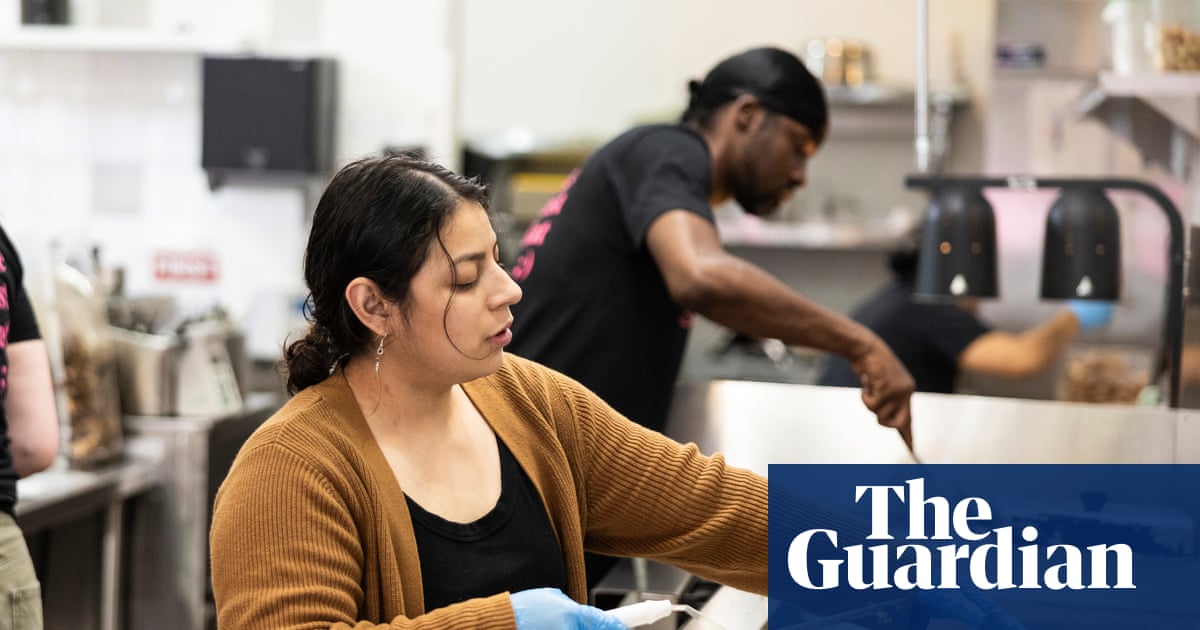All Square, a neon-lit diner inMinneapolis, specializes in grilled cheese sandwiches with a twist. Variations on the menu include Jamaican jerk chicken with guava jam, brown sugar bacon doused in ranch dressing, and Granny Smith apple slices coated in brie and mozzarella.
But the sandwich shop offers more than elevated comfort food. All Square, which also operates a food-truck catering service, exclusively hires formerly incarcerated Minnesotans.
“It started with the idea of: how do we respond to this systemic issue of excluding formerly incarcerated folks from, well, everything once we welcome them home?” said Emily Hunt Turner, a civil rights lawyer who founded the restaurant in 2018.
The name All Square refers to the shape of the grilled cheese sandwich as well as the idea that those who served their time deserve a chance to restart their lives with a clean slate.
Hunt Turner, 41, said she built the menu around grilled cheese in part because the relatively low overhead allows her to focus on her true mission: supporting people coming home from prison.
Each year, Hunt Turner and her team hire five full-time fellows who were recently released from prison. Over the next year, those workers cook, clean and serve tables, earning up to $23 per hour, including tips.
When they’re not working at the restaurant, the fellows have access to a host of services, including therapy and workshops aimed at helping them launch their own businesses.
Taqee Abdul-Hakim, a fellow from the 2022 class, began working at the restaurant just one month after he was released from prison. He said the free therapy sessions helped clear his mind and dream bigger. The weekly paychecks allowed him to find an apartment and provide for his two young children, even enrolling one in gymnastics. Just as importantly, he said, flipping sandwiches with other formerly incarcerated people helped him stay out of trouble.
“I needed to reshape my friend group after I got out,” Abdul-Hakim said. “At All Square, it was nice to have those types of friends who are in the same position as me, who have been through it but trying to better our lives at the same time.”
All Square is part of a broader social enterprise of the same name. The non-profit, which has 25 employees and a $3m annual operating budget, also runs a law firm that provides services to justice-impacted Minnesotans and helps incarcerated people train in the law.
Hunt Turner founded All Square after working as an attorney for the US Department of Housing and Urban Development, where she saw first-hand how difficult it was for people with criminal histories to access housing.
“We were getting complaints from all over the country where folks were saying they’re being discriminated against on the basis of having a criminal record,” she said. “This kind of perpetual punishment is not something we can turn away from.”
Anestimated70 million Americans, about one in three adults, has an arrest or conviction on their record. They facehigh rates of homelessnessand steep barriers to employment. One in three formerly incarcerated people isunemployed, according to federal statistics, and being without a jobdoubles the oddsof returning to prison.
“We heard a lot from fellows that outstanding debt – child support arrears, student loan debt, traffic citations – can be such a barrier to starting over,” Turner said. “So we established a debt-alleviation fund that dispenses up to $2,000 in debt relief as they transition to the next chapter of their lives.”
To build the restaurant, Turner raised $250,000 from a Kickstarter campaign and a Minneapolis Foundation grant; she also sold a few dozen $1,000 memberships to the “Grilled Cheese for Life” club. Revenues from the restaurant support the organization’s other operations.
“The magic ingredient of All Square is that it’s not dependent on fundraising or donors,” said Bruce Reilly, a founding board member of the organization and an advocate for the formerly incarcerated. “People might not write you a $1,000 check, but they might come buy a sandwich every day for the next 10 years.”
The sandwiches are a hit, but some local groups question whether All Square is the best vehicle to support the Black and brown communities that are disproportionately involved with the justice system.
“Because it’s not founded or directed by justice-impacted people, it’s not equipped to help our community through re-entry,” said Kevin Reese, co-founder and co-executive director of the local organization Until We Are All Free.
Turner said the issue of representation and privilege is something the organization wrestles with constantly as it expands in size and ambition. “From our perspective, broad-based support and allyship are vital to forging social movements,” she said.
The program has graduated 56 fellows and provided $130,000 in debt relief and seed capital, Turner said. Graduates have gone on to launcha coffee importerand a custom grills shop, among other enterprises.
Abdul-Hakim, the 2022 fellow, used a $10,000 seed capital grant from All Square to launch a towing company, Mow-Tow. In addition to earning a living wage at the restaurant, he said the fellowship taught him how to create a business plan and build up his credit.
“If I didn’t come across All Square, to be honest, I don’t think I’d be down the path I’m on now,” he said.
